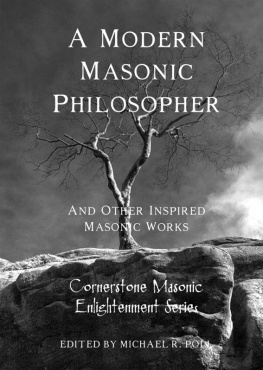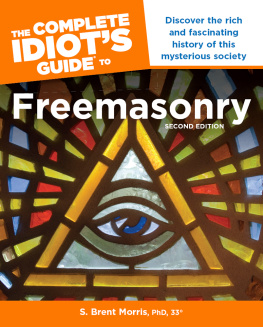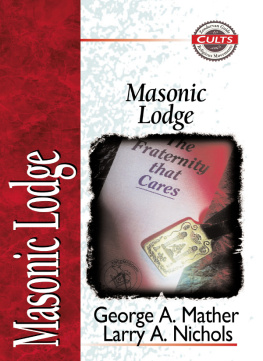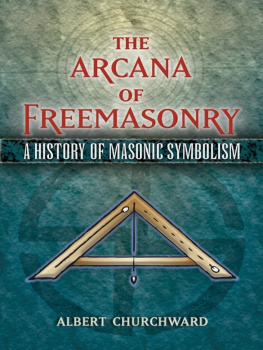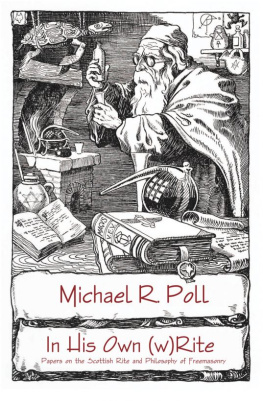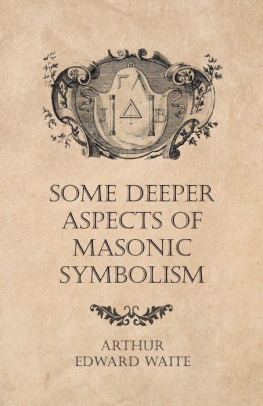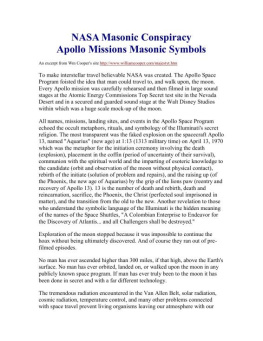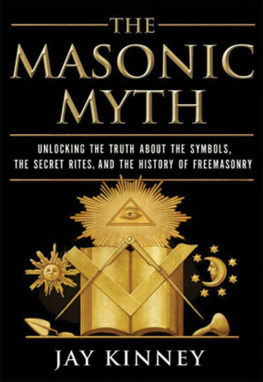A MODERN MASONICPHILOSOPHER
And Other Inspired MasonicWorks
Edited by Michael R. Poll
Copyright Michael R. Poll 2011
All rights reserved under International andPan-American Copyright Conventions.
License Statement
This ebook is licensed for your personalenjoyment only. This ebook may not be re-sold or given away toother people. If you would like to share this book with anotherperson, please purchase an additional copy for each reader. Ifyou're reading this book and did not purchase it, or it was notpurchased for your use only, then please return to Smashwords.comand purchase your own copy. Thank you for respecting the hard workof this author.
Smashwords Edition
Published by Cornerstone Book Publishers
New Orleans, LA
First Cornerstone Edition - 2011
http://www.cornerstonepublishers.com
E-Book Edition ISBN:1-613420-20-X
ISBN 13: 978-1- 613420-20-1
MADE IN THE USA
Table of Contents
BY FRANCIS W. SHEPARDSON
BY ALBERT G. MACKEY
BY E. M. SHOWALTER
BY JOSEPH FORT NEWTON
BY FRANK L. HAYCOCK
BY WILDEY E. ATCHISON
BY J. F. KIRK
BY O.D. STREET
BY GEO. E. FRAZER
BY OSSIAN LANG
BY A. S. MACBRIDE
BY J.L. CARSON
BY GEO L SCHOONOVER
BY H. A. KINGSBURY
BY GEORGE B. THOMAS
BY THE REV. GEORGE OLIVER, D.D.
BY WM. F. KUHN
BY LOUIS BLOCK
BY WILLIAM H. TAYLOR
BY HAROLD A. KINGSBURY
BY JOSEPH BARNETT
BY HENRY HART MILLMAN
BY R. I. CLEGG
BY E.R. BURKHALTER, D.D.
BY J.L. CARSON
BY GEO. W. BAIRD
BY LEWIS A. McCONNELL
BY PRESIDENT WILLIAM HOWARD TAFT
BY H. A. KINGSBURY
BY WM. G. MAZYCK
BY LEO FISCHER
BY C. PURDON CLARKE
BY HENRY BIXBY HEMENWAY, A.M., M.D.
BY HENRY BANKS
BY H. A. KINGSBURY
BY HAROLD A. KINGSBURY
BY J. GEORGE GIBSON
BY WM. F. KUHN
A MODERN MASONICPHILOSOPHER
BY FRANCIS W.SHEPARDSON
PHILOSOPHICAL in title and deeplyphilosophical in their interpretation of the study and thought ofthe wise men of Freemasonry, Dr. Roscoe Pound's "Lectures on thePhilosophy of Freemasonry" reflect in admirable fashion the idealand the earnest purpose of the National Masonic Research Society,which has just re-published them in attractive and convenient form.The lectures were prepared primarily for members of the AcaciaFraternity, the college secret society which is composed of MasterMasons. They were delivered also either in part or in theirentirety before the Grand Lodges of Nebraska and of Massachusetts.They made the most striking series published in the first volume of"The Builder," and many who read them first in the periodical willbe happy now to have them in compact book form for the libraryshelf.
Professor Pound's discontent with theordinary aimless speeches made in Masonic lodges by visitingbrethren first led him to determine to try to give out something ofreal value when, as often was the case, he himself was called uponto respond "for the good of the order." A thorough student, everseeking foundation principles upon which to build, and so paving inhis own field of legal inquiry a sure road that led him eventuallyto the coveted chair of Carter professor of jurisprudence inHarvard University, he found in the marvelous mechanism of Masonryjust the sort of inspiration to investigation that appealedstrongly both to his nature and to his philosophical training. Ofthe five departments of Masonic study, Ritual, History, Philosophy,Symbolism and Law, he chose the one dealing with Masonicfundamentals, and then proceeded, with wide reading and rareinsight, in the preparation of the "Lectures," which are certain tobe counted of high value by those who, without his patience,application, or constructive energy, will not pursue individualresearches but will turn to his carefully-phrased pages for theirown enlightenment.
In the titles alone there is an appealingsubtlety which attracts attention right at the start and is certainto prove stimulating to the thoughtful mind. The wealth ofmaterials is revealed; the breadth and depth of the inquiry isreflected; the unfolding development of the institution is madeclear; the comprehensive character of Masonry is magnified. InPreston, Krause, Oliver and Pike are found, in order, the exponentsof Masonry in its relation to education, to morals and law, toreligion, to metaphysics and the problem of reality. And then,climacteric in position and of deep significance to the Mason oftoday and tomorrow, is the study-of the relation of Masonry tocivilization, an attempt to answer the three questions, everpresent and ever pressing, What is the purpose of Masonry, What isits place in a rational scheme of human activity ? How does Masonryachieve its end?
Philosophy in itself is not an easy subject.Its problems are large. The nature of reality, the conduct of life,the relation of the human being to the universe, are topics whichcarry the mind to the border land of infinity. The terminology ofthe study is difficult for the uninitiated and untrained. But thereare few who pass the outer gates into the Kingdom of Masonry who donot at times ponder these themes and feel the longing of the mindfor light upon them. To interpret the thought of Masonicphilosophers and phrase it in terms intelligible to any one whowill read carefully and consecutively is no slight undertaking; tosucceed in it is a distinct triumph. This Professor Pound hasdone.
He gives the reader the key to the mysteries.The student of the Masonic philosophers needs "chiefly to connectthe Masonic thinking of these masters of the philosophy of theCraft with the general thought of the time and place in which theywrought and to perceive the problems raised by the civilization ofthose times and places in their relation to the ethical and socialproblems of today."
No better plan for the accomplishment of thisideal could have been followed than that of this volume. For, inthe case of the four philosophers studied, the story of each isfitted into a sort of mold. Who was the man? What were theprevailing characteristics of the period in which he lived andthought? What was his conception of the meaning of Masonry? Thereview of the biographical and environmental details involved inanswering the first two queries is so stimulating and suggestive asto make the careful reading of the "Lectures" well worth while toany Mason, even if he be neither disposed nor equipped to followthe close thought connected with the answer to the lastquestion.
The fifth lecture is a natural outcome of theother four. No one can learn what Preston, Krause, Oliver and Pikethought, each in his own day and generation, without applying theirviews of the philosophy of the Craft to present conditions. Timeschange and we change with them. So of this institution of ours. Ifit is to have a vital part in twentieth-century affairs, it mustrelate itself to twentieth-century thought. But it is far easier tolook back upon a-completed story than to interpret clearly what ispassing through the minds of contemporary-men. It is not at allimprobable, therefore, that the Masonic student of tomorrow,reading with pleased satisfaction the Pound "Lectures," will findtheir greatest value in the discussion of the Masonic philosophy oftoday by a writer of such keen intellect, logical force, andclarity of expression as the author is. Masonry today achieves itsend "by its insistence on the solidarity of humanity, by itsinsistence on universality, and by the preservation andtransmission of an immemorial tradition of human solidarity and ofuniversality."
The three centuries tell of knowledge, of theindividual moral life, of the universal human life. It is a storyof steady advance. It is the cumulative, constructive,forward-looking development of life toward "that divine, far-offevent, toward which the whole creation moves." So we give thisvolume of Masonic "Lectures" high rank in the literature ofphilosophy, convinced that it will find increased appreciation asthe days and years roll by.
Next page
